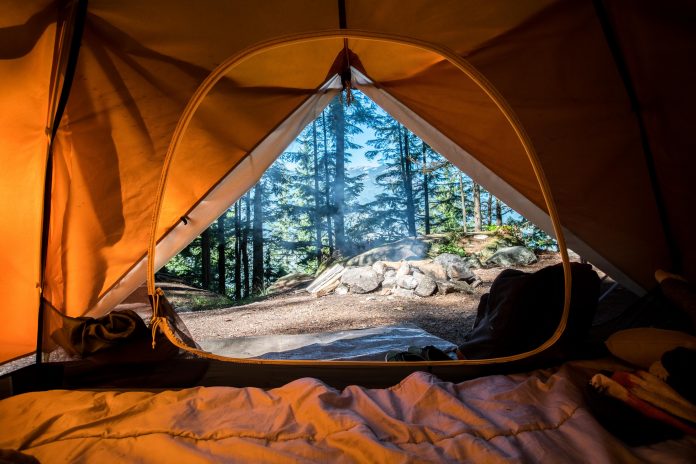RVers can sometimes get a bad rap. It’s easy to for others to think that RVing isn’t the most environmentally friendly choice — but that’s not always true. RVs are one of the only travel methods that combine both transport and accommodation, so four people traveling in an RV generally have a smaller carbon footprint than those flying to their destination and using a rental car to get around. And for those who opt to RV full time, you’re using far less energy than you ever would if you owned a home.
Seasoned RVer’s @chrisandnicole are passionate about keeping the environment safe and staying mindful while on the road. We asked them to share their best tips with our community to spread awareness on responsible RV and travel etiquette so that everyone can make small changes that will make a big difference.
1. USE ECO-FRIENDLY CLEANING PRODUCTS
When you’re camping and washing dishes or items, make sure you use a clean, bio-degradable soap that is paraben-free, vegan, phosphate-free as products like dawn are toxic to our environment and wildlife. A great option is the Unscented Company, they have an array of environmentally friendly household products, plus, they are Canadian owned!
Another important tip when doing your dishes is to make sure you wash your dishes at least 200 ft (or 70 big steps) away from any water source, do not wash anything in lakes, rivers or streams as this is harmful to not only the environment, but also all the wildlife that live or drink from our eco-systems.
2. BONFIRE ETIQUETTE
Camp in areas where wood is abundant if you plan on building a fire. Choose not to have a fire in areas where there is little wood at higher elevations, in heavily used areas, or in desert settings. A true “Leave No Trace” fire shows no evidence of having been constructed. Always put 100% of your campfire out as an unsupervised fire could lead to major damage, and massive danger to those in the area. Before leaving, always remember to check the areas surrounding your campsite for stray sparks or embers, which can easily start spot fires.
3. BE RESPONSIBLE PET OWNER
Keep your pets on a leash when walking your pet(s). Wildlife can be scared of other animals and it can impact their environment. Always, always, clean up after your pet and dispose in the garbage. There is nothing worst then a pet owner taking the time to clean up after their pup, but leave the bag on the ground! Use responsible waste bags, like BioBag Waste Bags, which are great alternative to regular polyethylene plastic bags because they’re made from a resin derived from plants, vegetable oils and compostable polymers. They can be readily composted along with organic waste in municipal composting facilities.
4. LEAVE YOUR CAMPSITE BETTER THAN YOU FOUND IT
This point speaks for itself! Always leave the campground cleaner than you found it.” If you find a mess on the ground, you clean it up regardless of who might have made it. You intentionally improve the environment for the next group of campers and helps the campground operators immensely. Always travel with waste bags to be prepared for anything you might find along your travels.
5. KEEP WILDFLOWERS AND PLANTS SAFE
Camp and walk on durable surfaces and pathways to help conserve the natural habitat of trail systems you explore. Most park trails in Canada are home to unique forest types characterized by a great diversity of plants and wildflowers which can unknowingly be stepped on if you explore off the path.
6. AVOID SINGLE USE PLASTIC LIKE THE PLAGUE
We already know how harmful single use items like plastic cups, plates, utensils and water bottles are to our environment, especially all the usage that can relate to quick RV trips. Be responsible and reduce your carbon footprint by using reusable items when your on the road, plus they will take you a lot further than having to repurchase them over and over again. Invest in a water purifier to avoid having to purchase single-use plastic bottles.
If you’re not already, take these tips with you every-time you hit the road, or wherever you go in general! We want to hear what responsible tips you have as an RVer road, share your tips with us on Facebook, Instagram, or Twitter or send us an e-mail.
Source: GO RVing








